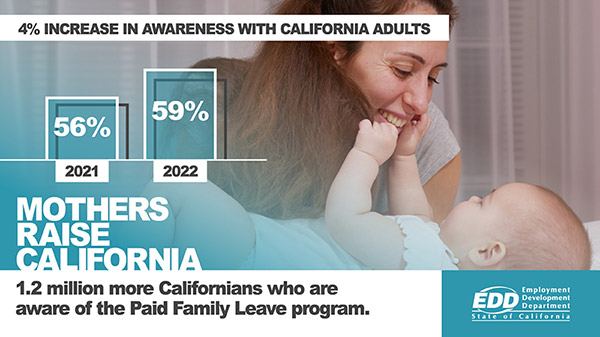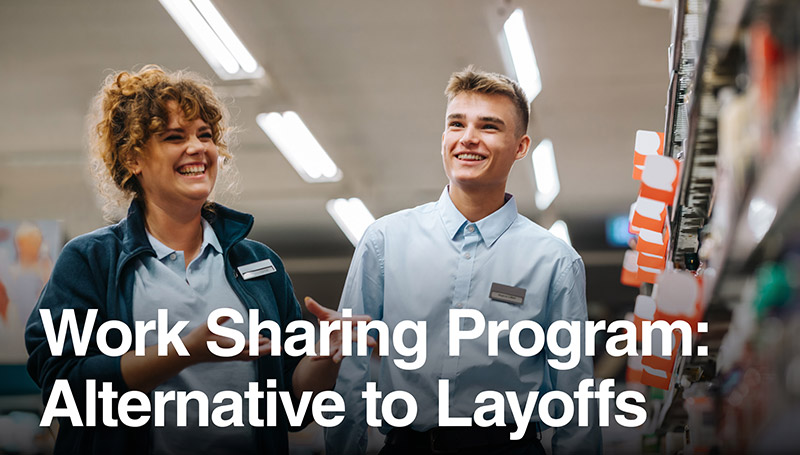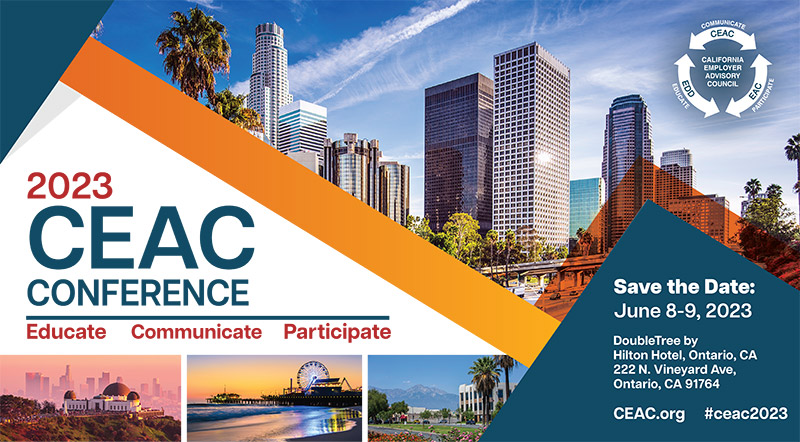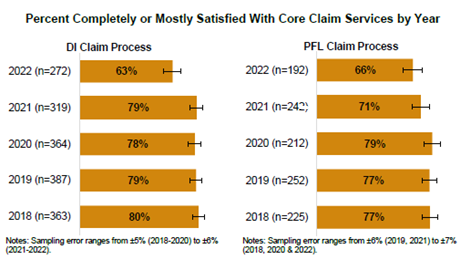
Benefiting Californians | May 2023
Welcome to the new Employment Development Department (EDD) newsletter, where we will share our story as the administrator of one of the nation’s largest public benefit systems—with over 21 million people filing 63 million unemployment, disability, and Paid Family Leave benefits claims over the past decade. We’re also the State’s largest tax collection agency and an integral player in the State’s workforce development system. This newsletter will help us transparently share our progress with some regular communication to help better inform you on the major changes impacting EDD customers.
Browse Articles
- Transforming the Customer Experience
- Listening to Our Customers is How We Modernize
- California's Paid Family Leave Gains Awareness in Key Underreached Populations
- The Work Sharing Program Helps California Employers Avoid Layoffs
- Supporting California Employers
- Expanding Outreach to California's Diverse Communities
- Customer Satisfaction Survey Results
Stay Connected!
Check out our blog for interesting articles on Department updates and more. Or, subscribe to our newsletter.
Transforming the Customer Experience

As EDDNext nears its first public milestone, we’re excited to begin communicating about this modernization project that will completely transform the customer experience. Over the next few years, we will be replacing our old benefit systems with new, updated, modern technology informed and influenced by customer and stakeholder input to make our customers’ experience easier and faster, from start to finish.
In June 2023, our existing customer portal, called Benefit Programs Online (BPO), will be replaced with myEDD, a simpler way to access our programs and services. Customers will log into myEDD.edd.ca.gov with their existing BPO credentials. In the coming weeks we will be notifying our customers about these enhancements that will improve the login process, make password recovery easier through self-service, and protect individual identities with secure login verification like online banking.
We will continue to incrementally implement customer experience improvements as part of EDDNext. This includes improving multilingual access, increasing self-service options, integrating benefit systems, enhancing call center services, and more. To provide transparency and accountability about our progress, we launched an EDDNext webpage with a one-stop location for project information and updates.
Listening to Our Customers is How We Modernize
Direct customer feedback is integral to our work to improve service levels for the millions of Californians who rely on the EDD for access to vital resources in times of need.
As we work toward improvements in the benefit application process, we have established an innovative team of Customer Experience and User Experience professionals. These specialists are conducting extensive customer research. They have interviewed past customers, new applicants, advocates, and community-based organizations—all who have contributed to nearly 5,000 hours of research and testing. Results were meticulously analyzed, and insights have already informed the design of the new myEDD portal as well as important changes to come in all areas of our benefit applications. The redesign of these and other vital forms is a high priority for EDDNext.
California’s Paid Family Leave Gains Awareness in Key Underreached Populations

We’re committed to continuing to boost public awareness about California’s Paid Family Leave program, which most California workers contribute to through mandatory payroll deductions. Our recent six-month outreach and marketing campaign increased public awareness among populations that could truly benefit from the program, including an increase of 15 percent for those with less than a high-school education and of 11 percent for households with incomes under $25,000. Awareness during the campaign increased nearly 4 percent statewide, roughly equal to reaching 1.2 million new Californians.
Overall, we’ve raised statewide Paid Family Leave awareness by 5.4 percent since 2016, and applications have increased 4.2 percent from 2018 to 2022.
We’re very proud to have reached people who need these benefits. Building on the effectiveness of this campaign, the Department is planning another substantial outreach effort beginning in 2024 to support the implementation of Senate Bill 951, which helps lower-wage workers access these vital benefits.
The Work Sharing Program Helps California Employers Avoid Layoffs

We strongly encourage any employers thinking about layoffs to try the newly revamped Work Sharing program instead. It’s fast and simple to apply online and manage a flexible Work Sharing Plan. Employers cut hours and wages while we make up for some of that lost income for workers with partial unemployment benefits. When the economy improves, employers won’t have to hire and train new workers.
Tom J., of A&M Welding in Gardena, CA, shares, “Without the Work Sharing program, we would have had to lay off several employees. The EDD’s Work Sharing program has been an invaluable asset allowing us to retain our employees during economic slowdowns.”
Employers across the state in various sectors are giving Work Sharing a try. It’s a win-win. We’ve hosted three full-capacity webinars this year to share information about the revised program, with more to come. Register now for the next webinar on July 13, and share this Work Sharing Program: Alternative to Layoffs (PDF) publication and our website resources with an employer you know.
Supporting California Employers

We’re looking forward to participating in the California Employer Advisory Council’s (CEAC’s) 2023 conference in Ontario on June 8-9. The CEAC is a nonprofit, statewide umbrella organization for local Employer Advisory Councils. In partnership with the EDD since 1980, the CEAC is an important connection for employers to employment and workforce development information. The CEAC is recognized by the Society for Human Resource Management (SHRM) and the 2023 conference includes opportunities to earn SHRM professional development credits. Visit CEAC.org for more information. #ceac2023
Save the Date
- Date: June 8–9, 2023
- Location: Doubletree by Hilton Hotel
222 N. Vineyard Ave., Ontario, CA 91764
Expanding Outreach to California’s Diverse Communities
We’re investing heavily in multilingual resources and support. We added dedicated phone lines staffed by experienced EDD representatives who speak Armenian, Korean, and Tagalog so California’s eight most spoken languages are served directly by the Unemployment Insurance program. We also have no-cost interpreters in over 100 languages.
Our website has language resources, including how to access an interpreter, for the most spoken languages in California. Those resources are located at the top of each EDD webpage with the globe icon for easy identification.
Other developments include:
- We are working next to add online unemployment applications in Simplified and Traditional Chinese, Vietnamese, Korean, Tagalog, and Armenian.
- We are partnering with community organizations to establish a Multilingual Access Advisory Committee that will advise on language considerations that affect people seeking and receiving our services and benefits.
- We’ve announced a new Language Access Officer, Erica Chovva Ruiz. She previously served as the Community Engagement Manager at the Department of Industrial Relations.
- We’ve launched a California’s Unemployment Language Opportunity Program, administered by The Center at Sierra Health Foundation, that is empowering communities to access EDD services. The grants provide support for education and outreach to communities of focus for them to better access the Unemployment Insurance program, and other services and benefits.
Customer Satisfaction Survey Results

Since 2016, our Survey and Applied Research team has surveyed thousands of our customers annually to help identify what’s working and spotlight opportunities for improvement.
Customer satisfaction with the Unemployment Insurance (UI) claim process fell in the early days of the COVID-19 pandemic but is now rising again. Sixty-nine percent of the customers surveyed in 2022 were completely or mostly satisfied with the application process, up from sixty-seven in 2021. The percentage of customers completely satisfied with EDD services rose to 46 percent, up from 41 percent in 2021.
A unique fraud attack caused Disability Insurance (DI) service levels to fall in late 2021 through 2022. Customer satisfaction fell 16 points from 79 percent in 2021 to 63 percent in 2022. In response, we’ve been working overtime and shifting staff and resources to improve service levels and speed claim processing.
Connect with Us
Introducing EDDNext
Meet EDDNext and learn how we're transforming your EDD experience, from start to finish.
